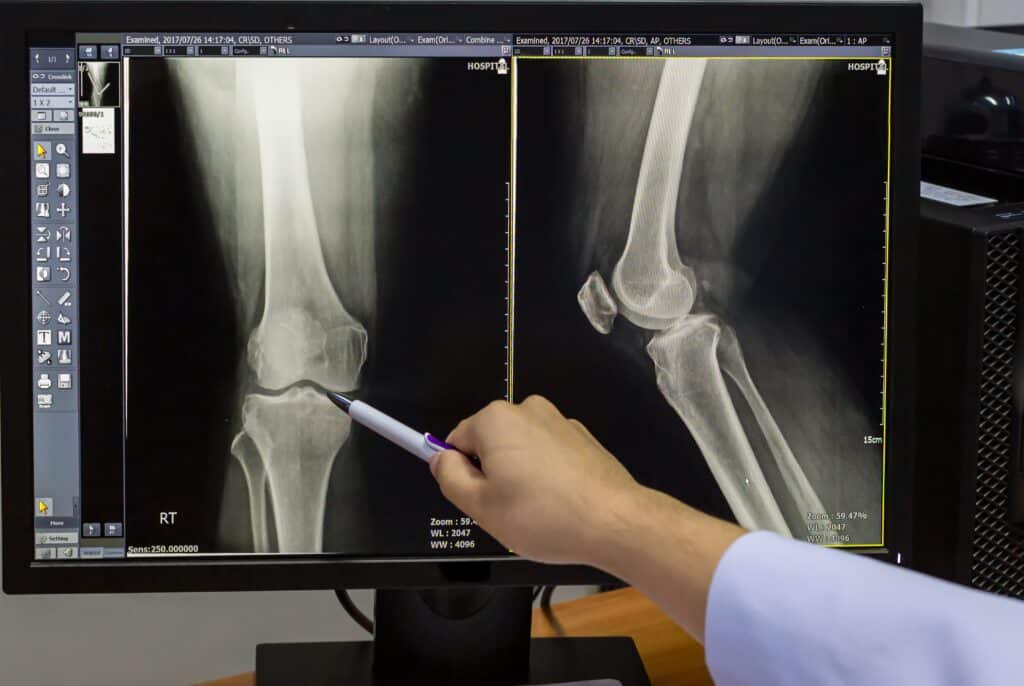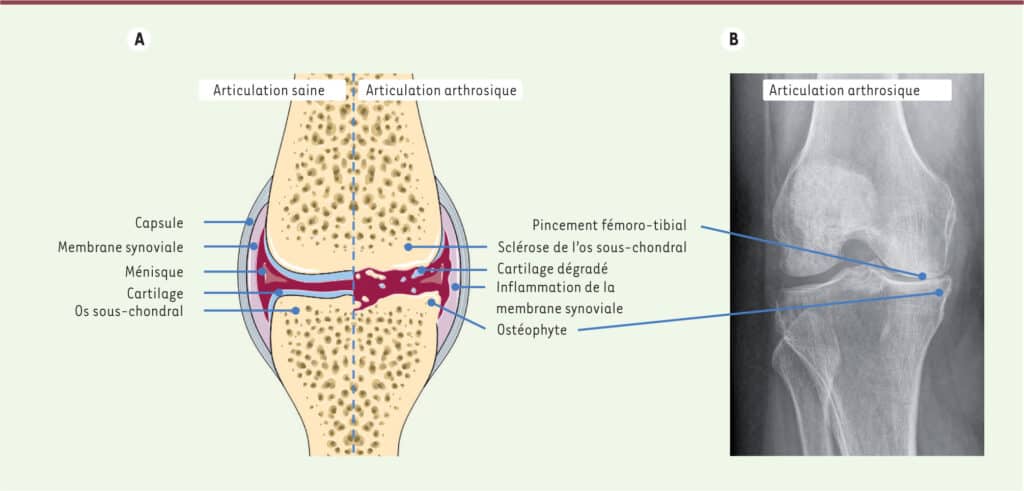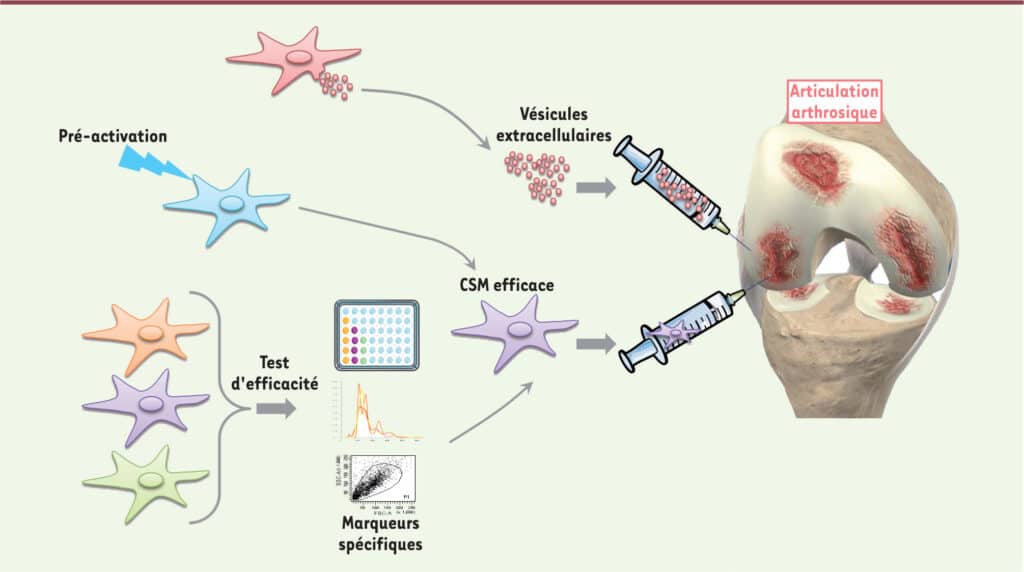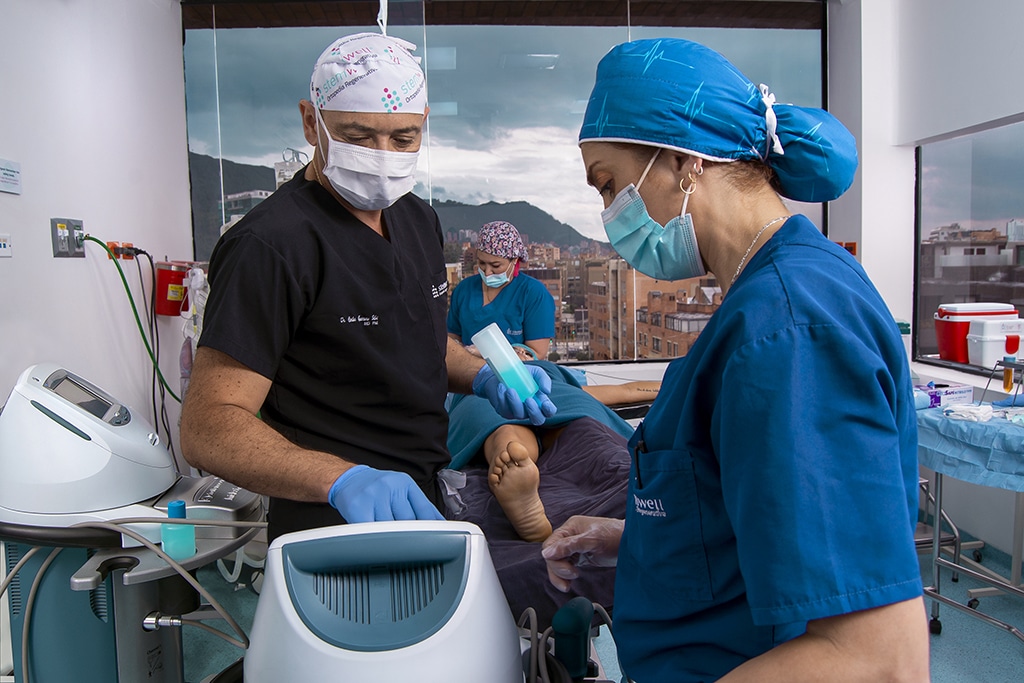In the ever-evolving field of medicine, patients with knee problems now have more options than ever before. While traditional interventions like knee replacement surgery are still popular, new and innovative treatments such as stem cell therapy are emerging as alternative options. Both treatments have their advantages, but how do they compare and what can patients expect?
In this blog, we’ll explore the nuances of stem cell therapy versus knee replacement surgery and address some frequently asked questions about choosing stem cell therapy either as an alternative or in conjunction with knee surgery.

Knee replacement surgery

Knee replacement surgery involves removing damaged parts of the knee and replacing them with artificial components. It’s a well-established procedure with a long history of success in alleviating pain and restoring function in severely damaged knees, typically due to arthritis or significant injury.
There’s no denying that knee replacement surgery is an invasive procedure. It can take several months of intensive rehabilitation and recovery to notice the benefits.
Stem cell therapy for damaged knees
Stem cell therapy is a relatively new and rapidly developing area of medicine that offers a less invasive alternative to surgery.
The treatment aims to initiate the body’s own healing mechanisms. Umbilical cord stem cells – the type we use at Stemwell – have the ability to specialize into a wide variety of cells. This means that when injected into a damaged area, they can develop into the specific cells needed in that region, helping to regenerate damaged tissues. Stem cells also have immunomodulatory properties, suppressing the immune system in order to reduce inflammation within the knee.
These unique qualities that stem cells have help to rebuild tissues, reduce inflammation, and improve pain and functioning in the knee – all without the need for surgery or artificial replacements.


Knee replacement surgery Vs stem cell therapy
Intensity and recovery time
Patients undergoing knee replacement surgery typically face a recovery period of several months, involving physical therapy and restricted activities to ensure proper healing. Surgery can also be a relatively intense process – it requires a lot of time, preparation, and commitment.
In contrast, stem cell therapy is a less invasive procedure which does not require surgery. Although rehabilitation and careful monitoring is still required after therapy, patients often experience a much quicker recovery with less downtime and fewer restrictions on activities post-treatment, compared to surgery.
Risks and complications
Knee replacement surgery, while generally safe and very well established, carries the risks of any major surgery, including infection, blood clot formation, and potential complications from anesthesia. It’s important to remember that these overall risks are low.
Stem cell therapy is generally considered low risk. Research on mesenchymal stem cells (MSCs), the type of cells used at Stemwell, shows that stem cell therapy is generally effective and carries minimal risks2. However, stem cell therapy is a relatively new treatment, so the long-term research on its efficacy and safety is still ongoing. Each individual is also unique and so responses to treatment may vary. It’s important to talk to your experienced practitioner to understand your specific risks.
Effectiveness
Knee replacement surgery has a proven track record for reducing pain and improving mobility in patients with severe knee damage. Alongside extensive rehabilitation, many patients show significant improvements in knee functioning.
Research on the effectiveness of stem cell therapy is still developing. Early studies look promising, demonstrating stem cell therapy as having a positive impact on alleviating joint pain, restoring knee joint function, and minimizing patient trauma. For patients with knee osteoarthritis, research also demonstrates that stem cell injections have remarkable clinical efficacy and safety3.
However, the effectiveness of stem cell treatment can vary and it’s generally considered more suitable for patients with mild to moderate knee damage.

Frequently asked questions
Stem cell therapy can be a great alternative for some people. Where candidates are suitable, for instance, with mild to moderate knee damage, stem cell therapy has potential to improve functioning and promote quicker recovery. It also allows individuals to avoid the risks and lengthy recovery associated with surgery. With stem cell therapy, some people may be able to avoid surgery completely.
As always, it’s important to talk to a specialist to determine if you are a good candidate.
In some cases, stem cell therapy may be used alongside knee replacement surgery to aid the healing process and potentially improve the outcome and overall pain relief. This approach should be carefully considered and discussed with your healthcare provider. More evidence suggests that stem cell therapy in combination with arthroscopic knee surgery – a surgery that preserves the natural knee joint – can also be effective for patients with severe knee osteoarthritis4.
Stem cell therapy is primarily aimed at individuals seeking to alleviate pain, improve functioning, and possibly delay or avoid knee replacement surgery. It’s most suitable for people with mild to moderate knee damage of the knee. For those with more major damage, knee replacement surgery is likely to be more effective.
The best way to determine the most suitable treatment for you is to consult with a specialist in regenerative medicine, such as Stemwell. We can assess your unique condition, discuss your treatment goals, and help you weigh up the benefits and risks.
Stem cell treatment at Stemwell

When it comes to treating knee problems, both stem cell therapy and knee replacement surgery offer valuable options. The choice between these treatments depends on a range of factors, including the severity of damage, your overall health, and treatment goals. Ultimately, the decision between stem cell therapy vs knee replacement will be a personal one – your individual situation may determine which solution is best for you.
At Stemwell, we are experts in providing world-class regenerative medicine treatments such as stem cell therapy. If you want to learn more about stem cell therapy or you are contemplating the possibility of using stem cell therapy to alleviate a debilitating knee condition you can contact us with any questions, or apply today to check your eligibility.
References
2 Nagamura-Inoue, T., & He, H. (2014). Umbilical cord-derived mesenchymal stem cells: Their advantages and potential clinical utility. World journal of stem cells, 6 2, 195-202 .
3 Kim, K. I., Kim, M. S., & Kim, J. H. (2023). Intra-articular Injection of Autologous Adipose-Derived Stem Cells or Stromal Vascular Fractions: Are They Effective for Patients With Knee Osteoarthritis? A Systematic Review With Meta-analysis of Randomized Controlled Trials. The American journal of sports medicine, 51(3), 837–848. https://doi.org/10.1177/03635465211053893
4 Julien Freitag, James Wickham, Kiran Shah, Douglas Li, Cameron Norsworthy, and Abi Tenen. (2020). Mesenchymal stem cell therapy combined with arthroscopic abrasion arthroplasty regenerates cartilage in patients with severe knee osteoarthritis: a case series. Regenerative Medicine, 15:8, 1957-1977



